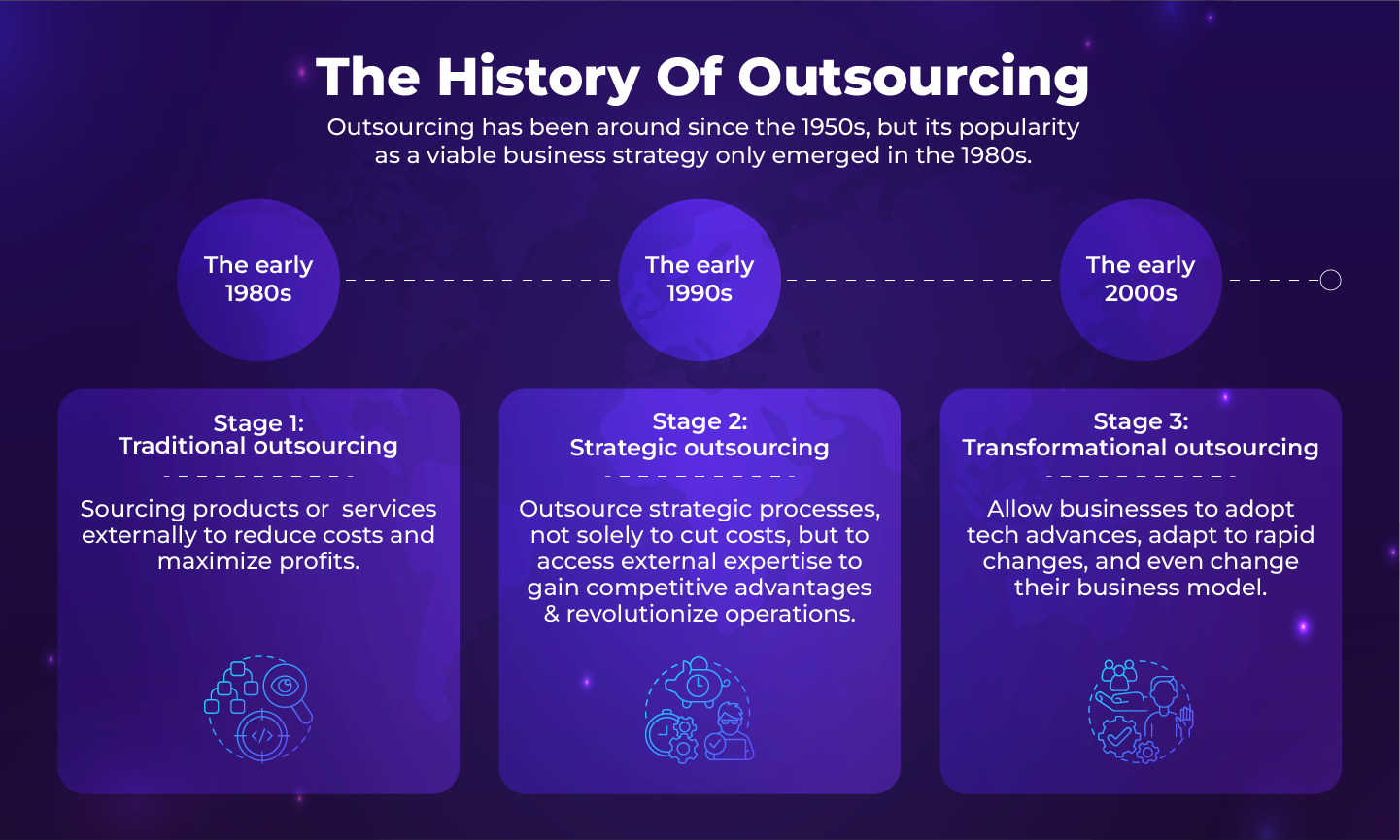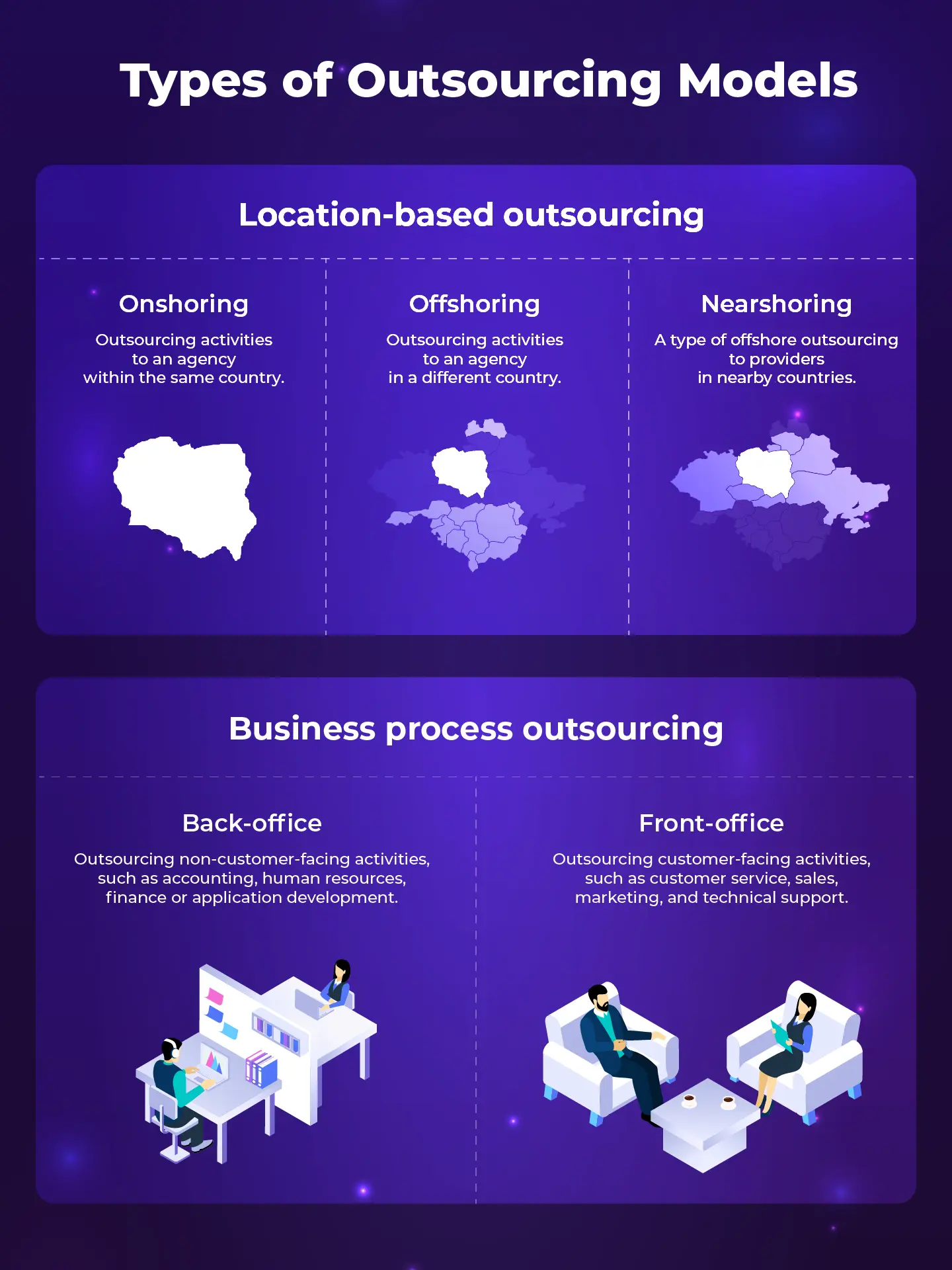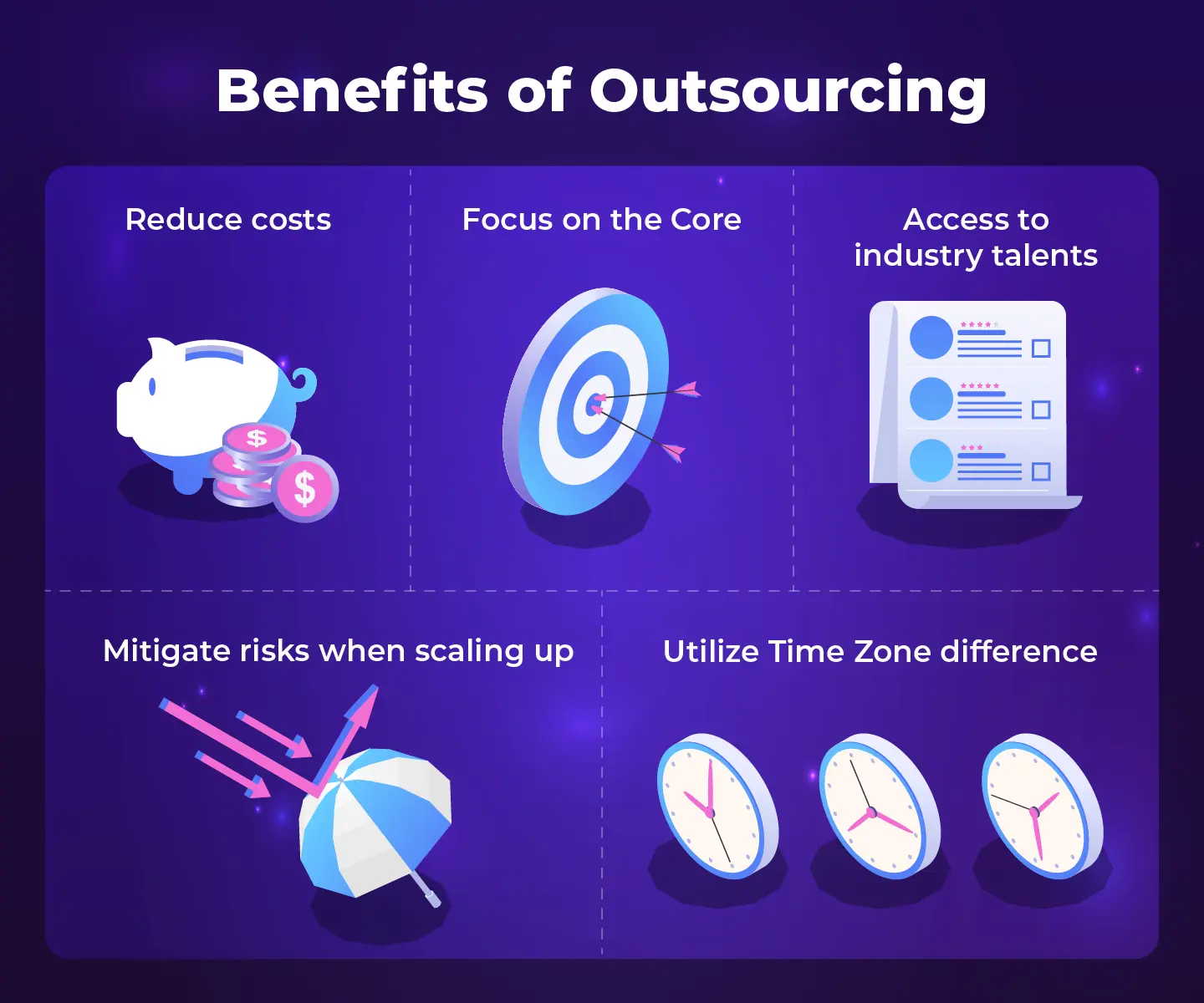Why is Outsourcing Worth Business Consideration in the Current Era?
April 17, 2023

Introduction
In today’s rapidly changing business environment, outsourcing is becoming increasingly popular. “Focus on what you do best & Outsource the Rest” has been considered a smart move for businesses that lack expertise in certain areas, such as recruitment, advertising or cloud migration.
So, what is Outsourcing? Why should businesses consider outsourcing some of their operational tasks to third-party providers? Let’s discover through this blog!
What is Outsourcing?
Outsourcing is the practice of hiring an external company, individual, or team to perform certain business functions or services that would normally be done in-house by the company itself. These functions or services include customer support, data entry, manufacturing, software development, human resources, accounting, etc.

Outsourcing has been around since the 1950s, but it wasn’t until the 1980s that it gained popularity as a viable business strategy. The evolution of outsourcing has opened up new possibilities for organizations to redefine and restructure their operations. In a relatively short period, outsourcing has undergone significant transformations, which can be divided into three key stages:
- Stage 1: In the early 1980s, the 1st stage of “traditional outsourcing” emerged, which was primarily focused on reducing costs and maximizing profits by sourcing products or services from external providers based on the transaction cost approach.
- Stage 2: In the early 1990s, the 2nd stage of “strategic outsourcing” came about. This stage involved outsourcing strategic processes that could have a direct impact on business performance and revolutionize business operations. The objective of outsourcing was not solely focused on cost optimization, but also on accessing external expertise to gain a competitive advantage and improve business processes.
- Stage 3: Since the early 2000s, “strategic outsourcing” has evolved into “transformational outsourcing” which allows businesses to adopt new technological advances and adapt to rapid changes. This approach enables outsourcing agencies to deliver innovation and enhanced operational benefits to clients. Transformational outsourcing can even change business paradigms and create a new business model.
What are the types of Outsourcing models?

When searching for “Types of outsourcing models”, you will see a lot of articles with different ways of classifications, along with different terms. Therefore, in order not to confuse you, we will divide outsourcing models based on 2 main aspects, Location-based and Function-based as below.
1. Location-based outsourcing
First, when taking into account the location-based aspect, outsourcing can be classified into three types, which are:
- Onshoring: outsourcing activities to an agency within the same country. This can be attractive for those that want to keep control over the outsourced activities and support the local economy.
- Offshoring: outsourcing activities to an agency in a different country, often one with lower labor costs. This is suitable for those looking to reduce costs and tap into specialized expertise.
- Nearshoring: a type of offshoring where companies select an outsourcing provider in a neighboring or nearby country, often with similar time zones or cultural backgrounds to maintain a level of proximity and cultural compatibility.
2. Business process outsourcing (BPO)
On the other hand, Business Process Outsourcing (BPO) is a well-known term for the Function-based outsourcing model. This is the practice of outsourcing non-core functions, such as accounting, payroll, human resources, procurement, and customer support, to an external service provider.
In general, there are 2 types of BPO:
- Back-office outsourcing: Involves outsourcing non-customer-facing activities, such as accounting, finance, human resources or app development company to improve efficiency, reduce costs, and free up resources to focus on core business functions.
- Front-office outsourcing: Involves outsourcing customer-facing activities, such as sales, marketing, and technical support to improve customer service, increase sales, and tap into specialized expertise.
Top 5 Reasons Why Companies Use Outsourcing

1. Reduce costs
By outsourcing non-core functions, businesses can optimize their financial resources by avoiding associated hiring costs such as software licensing fees, health insurance, and business trips. Sia Partners reports that US businesses have been able to achieve significant cost savings through outsourcing, with labor costs being reduced by 70% to 90%. This has been made possible by outsourcing activities to countries with a lower cost of living, such as the Philippines, which allows for minimizing labor wages.
In addition, outsourcing can help reduce the costs of the recruitment process by eliminating expenses associated with onboarding, training, and employee retention. It can also help businesses save on expenses related to renting workspace for staff and purchasing equipment needed for those functions. Given that, businesses can focus on their core competencies and invest their resources in other areas that can generate more revenue and growth.
2. Focus on the core
Top managers often find themselves spending their entire workday handling and providing feedback on their team members’ work. This can lead to feelings of overwhelm and dominate their time for higher-level tasks that are essential for the long-term success of the company.
By outsourcing non-core functions and freeing up resources, managers can eliminate distractions for tons of those peripheral tasks and get their 8-hour daily work time back (or hopefully 3 hours/day) to focus on their supposed-to-be-done work, such as creating a strong and positive culture, developing the core team, investing in technology, and developing products.
Managers can also utilize their free time to conduct business audits, identify bottlenecks in their operations and products, and plan improvements.
By prioritizing these areas, top managers can establish strong leadership, foster innovation, and increase employee satisfaction, setting their companies up for long-term success.
3. Access to industry talents
Outsourcing provides access to a global talent pool of industry experts from different parts of the world when a company’s internal workforce cannot meet its technical requirements. These experts can ensure customer satisfaction and competitive results. They also keep businesses ahead of the curve and up-to-date on the latest technology, trends, compliance factors, and security risks.
4. Mitigate risks when scaling up
Expanding or scaling your business comes with potential risks, and outsourcing is an effective way to mitigate those risks. Imagine how frustrating it is when you enter a new region and have to comply with new regulations of the local government and handle a bunch of administrative tasks! Outsourcing those tasks to a reliable agency seems to be a more efficient approach that helps your companies reduce the exposure to financial, legal, or reputational risks and optimize time to take advantage of new business opportunities
Outsourcing also allows businesses to share some risks with the outsourcing agency. This is because the agency is responsible for delivering the outsourced services and meeting the performance metrics in the outsourcing agreements between the two. In the event that the agency fails to provide the services to the required standard or within the agreed-upon timeframe and this results in financial loss for the business, the agency is obligated to take all necessary steps to rectify the issue as per the signed contract. This may include providing financial compensation to the business.
5. Utilize time zone difference
Offshoring Outsourcing to countries in different time zones can initially be viewed as a challenge for some businesses, which may have concerns about how it could affect operations in their home country. However, utilizing time zone differences can provide a significant advantage by unlocking several benefits, including:
- Flexible staff availability: Offshoring outsourcing allows businesses to set up teams and operational structures with flexibility, as the global outsourcing industry has established staff who are comfortable working both day and night shifts to accommodate clients’ needs. Although night shifts may come with slightly higher wages, outsourcing still provides significant cost savings compared to the cost in Western countries.
- Shorter project timelines: Offshore outsourcing enables businesses to minimize time-to-market by utilizing the Follow the Sun (FTS) workflow. With this approach, knowledge production is owned and advanced by a production site and handed off at the end of the workday to the next production site in another time zones to continue the work. To make it work, regular meetings among teams are crucial to ensure that projects progress smoothly and any issues are promptly addressed.
- 24/7 customer support: The current global marketplace requires businesses to have someone available to support customers at any time of the day. A popular way is that businesses will handle customer inquiries themselves during the day and set up remote teams to operate outside of regular operating hours, covering incoming emails, live chats, social media messages, and phone calls. This ensures customers receive timely support and enhance satisfaction.
The Rise of Vietnam’s IT Outsourcing: Why It’s a Smart Business Move
Terralogic’s expansion into Vietnam is a strategic decision driven by the country’s recognition as the top Software Development Outsourcing country in APAC. Vietnam has a dynamic and high-quality workforce with English proficiency, and its service costs are more affordable for businesses compared to other countries.
In addition, what makes Vietnam stand out from the rest is its social stability and supportive government. The country is free from religious strife, and its government has implemented various policies, such as tax incentives, e-government, and relaxed visas, to encourage foreign investment. These policies make it easier for global enterprises to establish and develop their businesses in Vietnam.
Given the above advantages, many global corporations and startups are now choosing Vietnam as their preferred outsourcing destination, creating a potential market for Terralogic to expand the business.
Final thoughts
Outsourcing is becoming a popular trend among businesses to focus their resources and efforts on core work, leading to innovation and sustainable success. It can also help businesses access industry talents, optimize time-to-market, and avoid operational risks.
If you are planning a software development project, outsourcing can be a cost-effective option that delivers high-quality results. Whether you require onshore or offshore outsourcing services, Terralogic can support you from anywhere in the world. With departments in the USA, India, the UAE, and Vietnam, we offer 24/7 support and are ready to leverage your business success in the long run. Get a free consultation now!
Keep reading about
LEAVE A COMMENT
We really appreciate your interest in our ideas. Feel free to share anything that comes to your mind.
Our 16 years of achievements includes:
-
10M+
lines of codes
-
2400+
projects completed
-
900+
satisfied clients
-
16+
countries served




